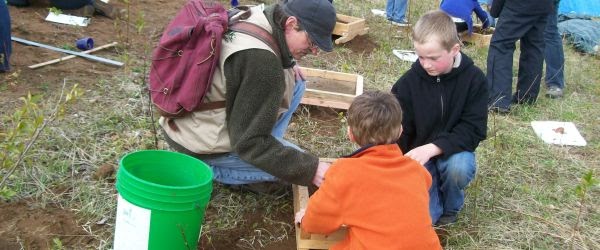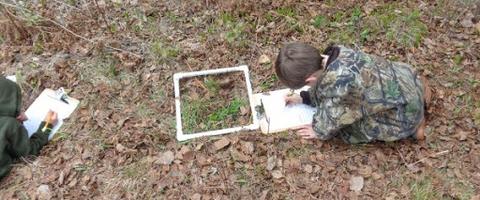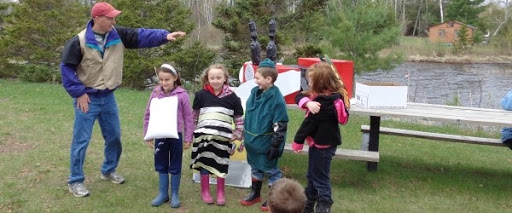Boulder Lake Environmental Learning Center, in close proximity to Duluth and the Iron Range, hosts an ideal outdoor classroom for a variety of K-12 and post-secondary lessons. Its trained environmental education staff provides engaging experiences tailored to you and your students' needs by utilizing Boulder Lake's unique access to aquatic and terrestrial ecosystems.
Aquatic Systems
Offered Spring, Summer, Fall- Grades 3-12
Class Objective
Students will demonstrate a basic to advanced understanding of the water cycle and a watershed. Students will also be able to give examples of aquatic food webs.
Lesson-Based Activities
- Macro Invertebrate Collection: Students will collect aquatic species using nets and will then use those specimens to help identify the health of the ecosystems.
- Incredible Journey: Students will participate in a water activity that demonstrates the paths and places water molecules travel throughout the water cycle.
- Fish Families: Students will learn about the adaptations of various Minnesota fish and how they are scientifically classified.
- Make a Watershed: Students will learn about the geological history of the area, and in turn, how these past events have shaped the land to what we see today.
- Lake Study: Students will learn about the aquatic food web within Boulder Lake by collecting data as a class. This will either be done on a Pontoon boat or in separate canoes.
Cultural History
Offered Spring, Summer, and Fall - Grades 3-8
Class Objective
Students will develop an understanding of the local culture within the Boulder Lake area by participating in archaeological and historical activities.
Lesson-Based Activities
- Mock Dig: Students will learn the scientific method as well as the cultural history of an area as they conduct a mock archaeological dig: These mock digs will be followed with a group discussion and possible activities for students based on the artifacts they have found during the dig.
- Clay Pot: Students will piece together their own archaeological study with parts of a clay pot they are given.
- Voyageur Canoe Ride: Students will participate in a lesson about the voyageurs and the fur trade while simultaneously paddling in the same type of 24 foot canoes that were used during that time period.
- Historic Logging: Students will participate in a theatrical activity that uses prop-artifacts to educate students about logging camp life and its impact on ecosystem.
Forest Systems
Offered Spring, Summer, Fall- Grades 3-12
Class Objective
Students will demonstrate an understanding of the nutrient flow in a forest ecosystem, the basic structures of trees, and the use of a dichotomous key.
Lesson-Based Activities
- Interpretive Forestry Hike: Students will explore the different species of flora and coniferous/deciduous trees within the forest at Boulder Lake.
- Invasive Species: Students will participate in activities that show the types of impacts that non-native species have had on the native ecosystem. Some examples of these species are: Zebra/Quagga Mussels, Japanese Knotweed, Earthworms, and the Emerald Ash-borer.
- Tree Identification: Students will learn what a dichotomous key is and how to use it to identify several common northern Minnesota trees.
- Forest Management Field Tour: Students will learn how forest systems are managed, including but not limited to, planning, harvesting, forest-based products, and forest regeneration.
Featured Curriculum: School Forest Carbon Sequestration Pilot
Wildlife
Offered Spring, Summer, Fall, and Winter- Grades 3-12
Class Objective
Students will be able to describe and give examples of animal adaptations, tracks, and signs.
Lesson-Based Activities
- Animal Signs: Students will learn about various animal tracks and signs with an interactive lecture, after which they will participate in an interpretive hike with an instructor to give the students an opportunity to apply the material they have just learned.
- Entomology: Students will learn about insect anatomy and habitat through hands on activities. Students will participate in insect collection and classifications for both terrestrial and aquatic species.
- Management Sites: Students will be guided through specific forest management sites such as bird nesting areas, insect traps, or flora related areas.


